Presentation
Chest pain, shortness of breath.
Patient Data
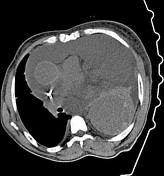

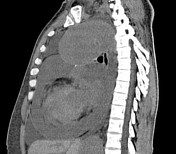

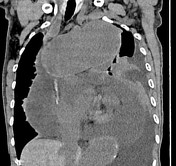

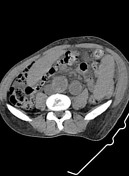

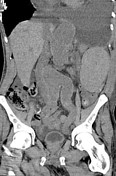


Massively dilated and abnormal thoracic aorta. Relatively abrupt transition from mildly dilated proximal ascending aorta (4.5 cm) to massively dilated aortic arch (8 cm). Both ascending and descending aortic dissection flaps. Massive pericardial effusion. Left pleural effusion with atelectasis. Diminished attenuation of blood pool compared to myocardium indicating anemia.
Abdominal aortic and iliac aneurysm with dissection and plaquing. Small amount of ascites.
Case Discussion
Very dramatic case of an extremely abnormal and aneurysmal thoracic aorta with dissection, resulting in a massive pericardial effusion. The abdominal aorta is also aneurysmal with dissection flap and likely associated atherosclerotic plaquing. It almost defies belief that an aorta can dilate to this extent (8 cm transverse measurement of the arch), and although the patient had no relevant history, an underlying connective tissue disorder seems highly likely. Unfortunately no treatment options were available for this advanced presentation.




 Unable to process the form. Check for errors and try again.
Unable to process the form. Check for errors and try again.